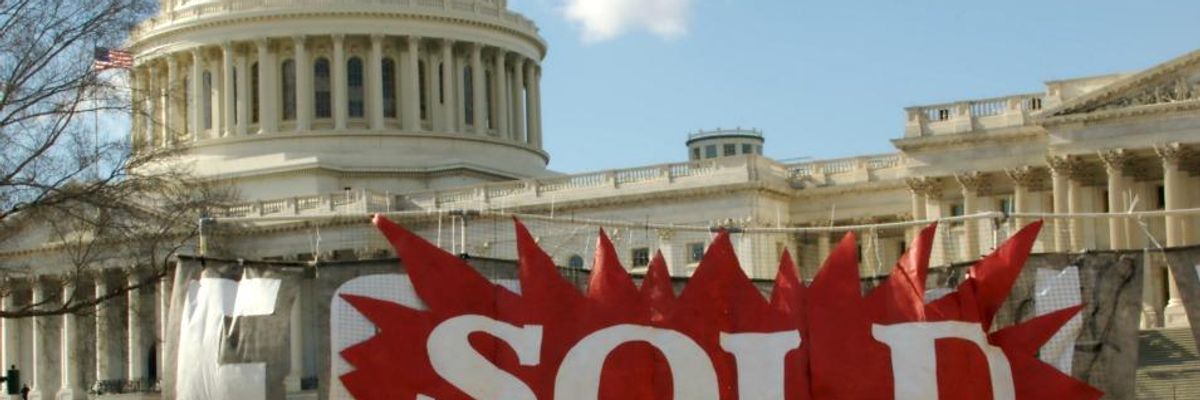Watchdog groups are sounding the alarm as congressional lawmakers finalize an eleventh-hour omnibus bill, which observers say contains gifts to both big monied banks and donors.
Thanks to a provision slipped into the more than $1 trillion congressional funding bill, which lawmakers agreed to late Tuesday evening, wealthy donors will now be legally permitted to contribute even more funds to political parties.
"The last thing the American people want is for Congress to give big donors even more influence in politics, but that's exactly what this provision will do." --Nick Nyhart, Public CampaignThe behemoth spending bill funds a wide variety of government programs, from school lunches to environmental protections.
The spending package (pdf), which is expected to be voted on by before the weekend, includes a provision (see page 1599) to create three separate accounts within the Democratic National Committee and the Republican National Committee, each for reportedly different purposes such as operating costs, legal proceedings, and each party's nominating convention.
Each donor would now be permitted to to contribute $97,200 to each fund annually, meaning that a single donor could contribute up to $324,000 per year to finance a party's operations. For comparison, the current maximum limit a donor can give to a national party committee each year, which was set by 2002 McCain-Feingold campaign finance reform law, is $32,400, plus an additional $32,400 in the event of an election recount.
"This makes the Great Train Robbery look like a petty misdemeanor," Fred Wertheimer, president of the advocacy group Democracy 21, told the Washington Post. "These provisions have never been considered by the House or Senate, and were never even publicly mentioned before today."
"Congress should act to reform campaign finance law, through a public debate with an eye toward increasing the electoral participation of ordinary citizens. Instead, they agreed on changes at the midnight hour increasing the power of a few wealthy people to exert outsize control over our elections and political parties." --Lawrence Norden, Brennan Center for Justice
"The last thing the American people want is for Congress to give big donors even more influence in politics, but that's exactly what this provision will do," agreed Nick Nyhart, president of the election reform nonprofit Public Campaign. "The biggest donors will be able to buy more access and influence and everyone else back home will continue wondering who their elected officials are working for."
Lawrence Norden, who heads the Democracy Program at the Brennan Center for Justice, said it is deplorable that such radical changes to campaign finance reform rules are being attempted without public input or broad discussion.
"Congress should act to reform campaign finance law, through a public debate with an eye toward increasing the electoral participation of ordinary citizens," Norden said. "Instead, they agreed on changes at the midnight hour increasing the power of a few wealthy people to exert outsize control over our elections and political parties. This raises the suspicion that politicians are trying to manipulate the campaign finance system for their own benefit, which will serve only to decrease average citizens' participation in our electoral process."
Further sticking it to the American people, Wall Street was also able to tuck into the omnibus bill a provision that will allow the country's too-big-too-fail banks to return to the practice of gambling on derivatives--the same high-risk activity that precipitated the 2008 crash--with funds that are insured by taxpayers.
As former Wall Street executive and senior fellow at Campaign for America's Future Richard Eskow explains, the amendment in question, which would repeal a key protection in the Dodd-Frank Act known as the 'swaps push-out rule,' was largely written by lobbyists for Citigroup.
"We are at a pivotal moment in the struggle to restrain the financial industry's toxic blend of recklessness and political influence," Eskow writes. "Bankers have had many political victories since their moment of financial failure, but those victories have been incomplete -- until now. Has their hour come around at last?"
Sen. Elizabeth Warren (Mass.) said in a statement: "Middle-class families are still paying a heavy price for the decisions to weaken the financial cops, leaving Wall Street free to load up on risk."
"Congress should not chip away at important reforms that protect taxpayers and make our economy safer," added Warren, who--alongside fellow Democratic Sens. Sherrod Brown (Ohio), Jeff Merkley (Ore.), and Carl Levin (Mich.)--has fought the rule change.
Politicodetails some of the other provisions included in the spending bill.
The House Rules Committee is expected to mark up the compromise spending bill Wednesday afternoon, with a likely House vote on Thursday, the day of the bill's deadline. However, The Hill reports, the vote may not occur in the Senate until Friday or over the weekend.

